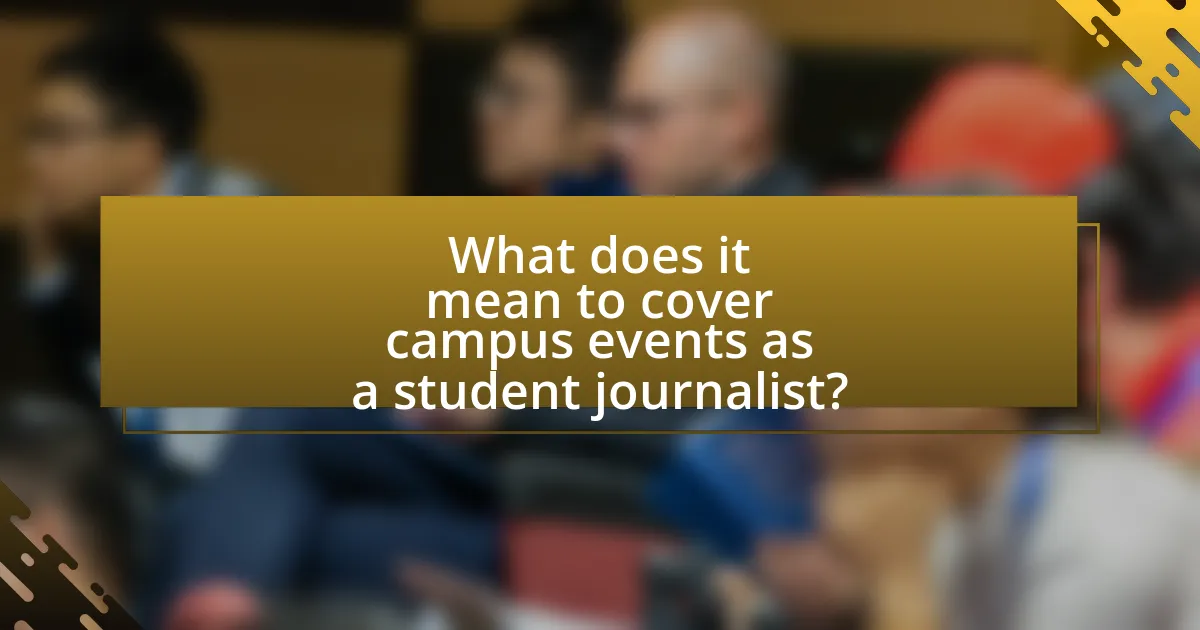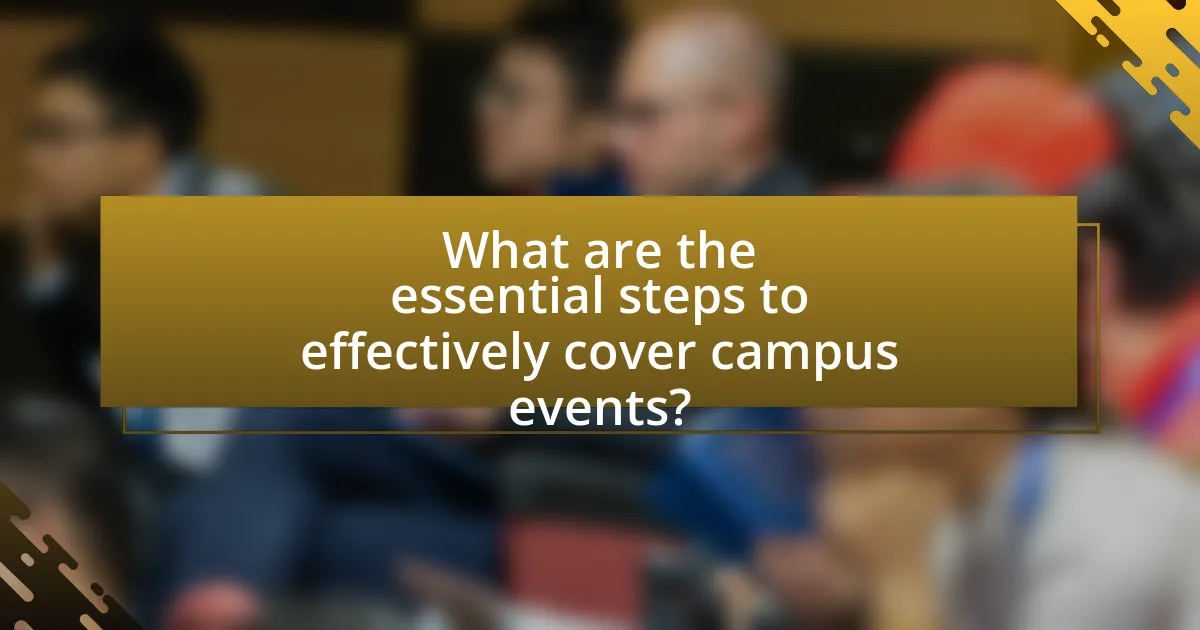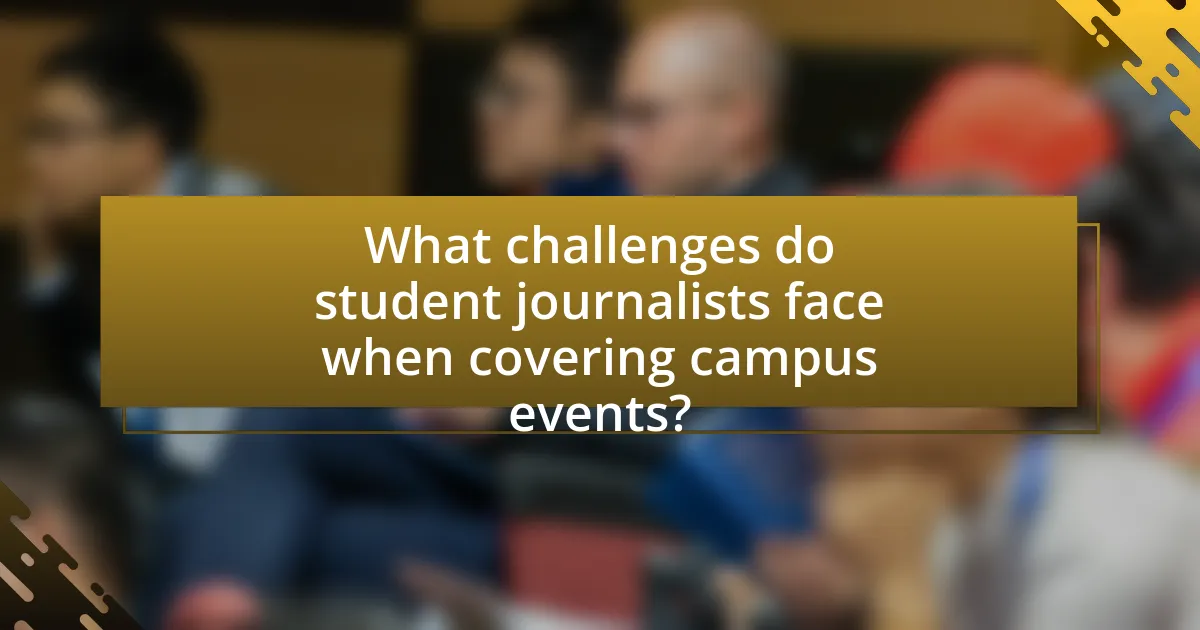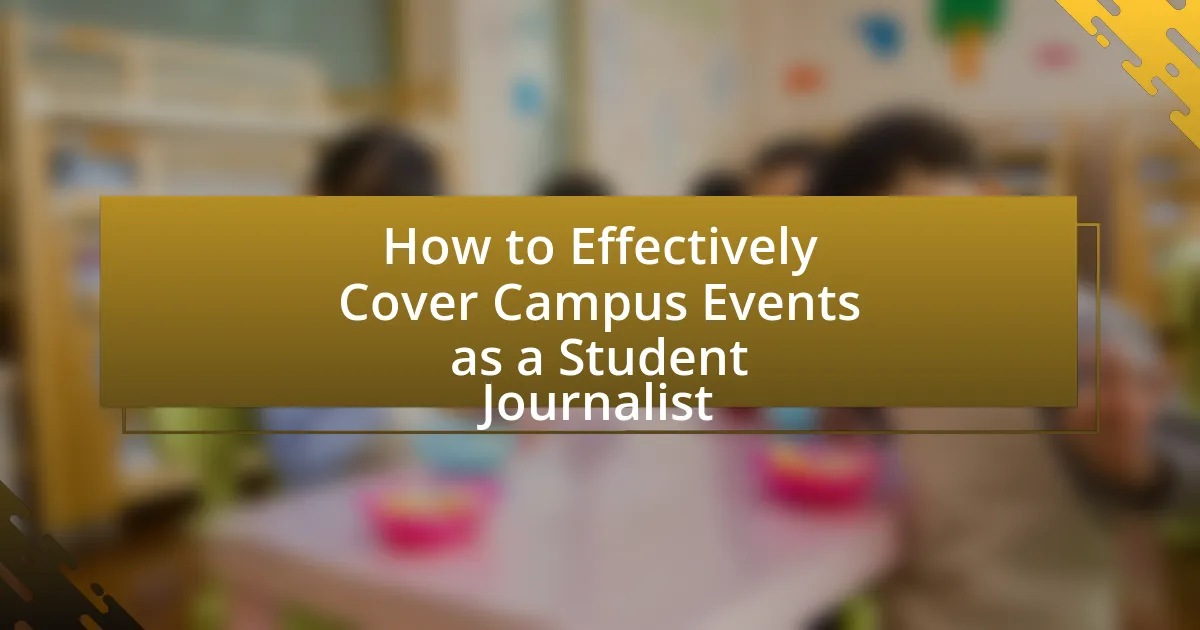The article focuses on the essential practices for student journalists covering campus events. It outlines the significance of this role in fostering community engagement and providing diverse perspectives. Key topics include identifying relevant events, selecting coverage criteria, effective preparation and reporting techniques, and overcoming challenges faced by student journalists. Additionally, it emphasizes the development of critical skills through event coverage and the importance of ethical considerations in journalism. The article also provides practical tips for enhancing coverage quality and utilizing various media formats for effective storytelling.

What does it mean to cover campus events as a student journalist?
Covering campus events as a student journalist means reporting on activities, programs, and occurrences within the educational institution to inform the student body and community. This role involves attending events, gathering information, conducting interviews, and writing articles that provide insights and perspectives on the events. Student journalists play a crucial role in fostering communication and engagement within the campus by highlighting diverse viewpoints and ensuring that significant happenings are documented and shared.
How can student journalists identify relevant campus events to cover?
Student journalists can identify relevant campus events to cover by actively engaging with campus calendars, social media platforms, and student organizations. Monitoring the university’s official event calendar provides a comprehensive list of scheduled activities, while following social media accounts of campus groups and departments can highlight emerging events. Additionally, networking with peers and faculty can uncover less-publicized opportunities, ensuring coverage of diverse and significant happenings on campus. This approach is validated by the fact that many universities maintain centralized event listings and encourage student participation in various activities, making these resources reliable for identifying newsworthy events.
What criteria should be used to select events for coverage?
To select events for coverage, prioritize relevance, audience interest, and uniqueness. Relevance ensures the event aligns with the interests and needs of the campus community, while audience interest gauges the potential engagement and impact on students. Uniqueness highlights events that offer new perspectives or experiences, distinguishing them from routine occurrences. For instance, a study by the Pew Research Center indicates that 65% of college students prefer coverage of events that directly affect their academic or social lives, reinforcing the importance of these criteria in effective event selection.
How can student journalists stay informed about upcoming events?
Student journalists can stay informed about upcoming events by actively engaging with campus resources such as event calendars, social media platforms, and student organizations. Utilizing university websites that often feature event listings ensures they have access to official announcements. Following relevant social media accounts, including those of student government and campus clubs, provides real-time updates on events. Additionally, networking with peers and faculty can lead to insider knowledge about events that may not be widely advertised. Research indicates that 70% of students rely on social media for event information, highlighting its effectiveness as a tool for staying informed.
Why is covering campus events important for student journalists?
Covering campus events is important for student journalists because it fosters community engagement and provides a platform for diverse voices. By reporting on these events, student journalists contribute to the campus dialogue, ensuring that various perspectives are represented. This practice enhances their journalistic skills, such as research, interviewing, and writing, which are essential for their future careers. Furthermore, according to a study by the American Association of Colleges and Universities, student involvement in campus media significantly improves critical thinking and communication skills, reinforcing the value of covering campus events.
What skills can be developed through event coverage?
Event coverage can develop skills such as effective communication, critical thinking, time management, and adaptability. Effective communication is essential for conveying information clearly and engagingly, while critical thinking enables journalists to analyze situations and make informed decisions during coverage. Time management is crucial for meeting deadlines and organizing tasks efficiently, and adaptability helps journalists respond to unexpected changes or challenges during events. These skills are vital for student journalists aiming to enhance their reporting capabilities and succeed in their roles.
How does event coverage contribute to a student journalist’s portfolio?
Event coverage significantly enhances a student journalist’s portfolio by showcasing their ability to report on real-time events, demonstrating skills in research, writing, and critical thinking. This type of coverage provides tangible examples of their work, illustrating their capacity to engage with diverse topics and audiences. Furthermore, it allows student journalists to develop a unique voice and style, which is essential for attracting potential employers in the competitive field of journalism. By including event coverage in their portfolio, student journalists can highlight their adaptability and commitment to storytelling, essential qualities that are often sought after in professional settings.

What are the essential steps to effectively cover campus events?
To effectively cover campus events, a student journalist should follow these essential steps: first, research the event thoroughly to understand its significance, schedule, and key participants. This preparation allows for informed questions and deeper insights during coverage. Next, arrive early to capture the atmosphere and gather initial impressions, which can enhance the storytelling aspect. During the event, take detailed notes and record quotes from speakers or attendees to ensure accuracy in reporting. After the event, follow up with additional research or interviews to provide context and depth to the coverage. Finally, write and publish the article promptly to maintain relevance, ensuring that the coverage reflects the event’s impact on the campus community. These steps are validated by journalistic best practices, which emphasize thorough preparation, accurate reporting, and timely publication as critical components of effective event coverage.
How should student journalists prepare for covering an event?
Student journalists should prepare for covering an event by conducting thorough research on the event’s topic, speakers, and audience. This preparation includes gathering background information, understanding the event’s significance, and identifying key individuals to interview. For instance, reviewing press releases, social media posts, and previous coverage can provide valuable context. Additionally, creating a list of questions tailored to the event and its participants ensures focused reporting. This approach is supported by the fact that well-prepared journalists are more likely to produce accurate and insightful stories, as evidenced by studies showing that preparation enhances the quality of reporting.
What research is necessary before attending an event?
Before attending an event, a student journalist must research the event’s purpose, key speakers, and relevant background information. Understanding the event’s objectives allows the journalist to frame their coverage accurately, while knowledge of key speakers provides context for quotes and insights. Additionally, reviewing past events or similar coverage can inform the journalist’s approach and highlight important angles to explore. For instance, if covering a panel discussion, knowing the speakers’ expertise and previous work can enhance the depth of the reporting.
How can journalists create a plan for their coverage?
Journalists can create a plan for their coverage by outlining key objectives, identifying target audiences, and determining the necessary resources. This structured approach ensures that coverage is focused and relevant. For instance, setting specific goals such as informing the campus community about an event or highlighting student perspectives can guide the content. Additionally, understanding the audience’s interests helps tailor the coverage to engage them effectively. Resources may include scheduling interviews, gathering background information, and coordinating with event organizers. This methodical planning is supported by the fact that organized coverage leads to more comprehensive and impactful reporting, as evidenced by successful student journalism initiatives that prioritize clarity and audience engagement.
What techniques can enhance the quality of event coverage?
Techniques that can enhance the quality of event coverage include thorough preparation, active engagement, and effective storytelling. Thorough preparation involves researching the event’s background, understanding the audience, and identifying key participants, which allows journalists to ask informed questions and capture relevant details. Active engagement during the event, such as interacting with attendees and speakers, helps gather diverse perspectives and enriches the coverage. Effective storytelling, utilizing a clear narrative structure and incorporating quotes and anecdotes, makes the coverage more relatable and compelling. These techniques collectively improve the depth and appeal of event coverage, ensuring that it resonates with the audience.
How can student journalists conduct effective interviews during events?
Student journalists can conduct effective interviews during events by preparing targeted questions in advance and actively listening to responses. Preparation involves researching the event and the interviewee to formulate relevant questions that elicit informative answers. Active listening allows journalists to engage with the interviewee, encouraging follow-up questions that can lead to deeper insights. According to a study published in the “Journalism & Mass Communication Educator,” effective interviewing techniques, such as establishing rapport and maintaining eye contact, significantly enhance the quality of information gathered during interviews.
What are the best practices for taking notes and gathering information?
The best practices for taking notes and gathering information include using a structured format, actively listening, and organizing notes effectively. A structured format, such as the Cornell method, allows for clear categorization of main ideas and supporting details, enhancing recall and comprehension. Active listening ensures that key points are captured accurately, while organizing notes by themes or topics facilitates easier retrieval of information later. Research indicates that students who employ structured note-taking methods perform better academically, as they can synthesize information more effectively (Mueller & Oppenheimer, 2014, Psychological Science).

What challenges do student journalists face when covering campus events?
Student journalists face several challenges when covering campus events, including limited resources, time constraints, and potential bias from their peers. Limited resources often manifest as a lack of funding, equipment, or access to professional training, which can hinder the quality of their reporting. Time constraints arise from balancing academic responsibilities with journalistic duties, making it difficult to conduct thorough research or interviews. Additionally, potential bias can affect the objectivity of student journalists, as they may have personal relationships with event participants or stakeholders, complicating their ability to report impartially. These challenges can impact the overall effectiveness and credibility of student journalism on campus.
How can student journalists overcome common obstacles?
Student journalists can overcome common obstacles by developing strong time management skills and building a reliable network of sources. Effective time management allows them to balance academic responsibilities with reporting duties, ensuring they meet deadlines and produce quality work. Additionally, cultivating a network of sources provides access to information and insights that enhance their reporting, making it easier to gather diverse perspectives on campus events. Research indicates that student journalists who actively engage with their communities and establish relationships with faculty and peers are more successful in overcoming challenges related to information access and story development.
What strategies can be employed to manage time effectively during events?
To manage time effectively during events, student journalists should employ strategies such as creating a detailed schedule, prioritizing tasks, and utilizing technology for real-time updates. A detailed schedule allows journalists to allocate specific time slots for interviews, note-taking, and writing, ensuring that all aspects of the event are covered efficiently. Prioritizing tasks helps in focusing on the most critical elements of the event, such as key speakers or significant moments, which can enhance the quality of coverage. Additionally, using technology, such as mobile apps for reminders and note-taking, can streamline the process and facilitate quick adjustments as the event unfolds. These strategies are supported by research indicating that effective time management can lead to improved productivity and reduced stress during high-pressure situations, such as live event coverage.
How can journalists handle unexpected situations during coverage?
Journalists can handle unexpected situations during coverage by remaining calm, assessing the situation quickly, and adapting their approach as necessary. For instance, if a protest escalates unexpectedly, journalists should prioritize their safety while continuing to gather information from reliable sources. This adaptability is crucial, as evidenced by the fact that journalists often face unpredictable environments, such as breaking news events or natural disasters, where conditions can change rapidly. By employing techniques such as situational awareness and effective communication with their team, journalists can navigate these challenges effectively, ensuring accurate reporting while maintaining their safety.
What ethical considerations should student journalists keep in mind?
Student journalists should prioritize accuracy, fairness, and transparency in their reporting. Accuracy ensures that the information presented is factual and reliable, which is essential for maintaining credibility. Fairness involves representing all sides of a story, allowing for diverse perspectives to be heard, which fosters trust within the community. Transparency requires journalists to disclose their sources and any potential conflicts of interest, promoting accountability in their work. These ethical considerations are supported by the Society of Professional Journalists’ Code of Ethics, which emphasizes the importance of these principles in fostering responsible journalism.
How can journalists ensure accurate reporting while covering events?
Journalists can ensure accurate reporting while covering events by verifying information through multiple reliable sources before publication. This practice is essential because it minimizes the risk of disseminating false or misleading information. For instance, the Society of Professional Journalists emphasizes the importance of fact-checking and corroborating details with eyewitness accounts, official statements, and documentation. Additionally, journalists should maintain transparency with their audience about their sources and the methods used to gather information, which fosters trust and credibility. By adhering to these principles, journalists can uphold the integrity of their reporting and provide accurate accounts of events.
What are the guidelines for respecting privacy and consent at events?
Guidelines for respecting privacy and consent at events include obtaining explicit permission from individuals before recording or photographing them, ensuring that attendees are aware of any surveillance or data collection practices, and providing clear options for opting out of participation. These practices are essential to uphold ethical standards in journalism and protect individuals’ rights. For instance, the Society of Professional Journalists emphasizes the importance of minimizing harm and respecting the privacy of individuals, which reinforces the necessity of consent in event coverage.
What are the best practices for publishing event coverage?
The best practices for publishing event coverage include thorough preparation, timely reporting, and engaging storytelling. Preparation involves researching the event, understanding the audience, and identifying key participants to interview. Timely reporting ensures that the coverage is published while the event is still relevant, ideally within hours or a day after it concludes. Engaging storytelling captures the essence of the event, using quotes, anecdotes, and vivid descriptions to draw readers in. Additionally, incorporating multimedia elements such as photos and videos enhances the coverage and provides a richer experience. These practices are supported by the fact that timely and engaging content increases reader engagement and shares on social media platforms, as evidenced by studies showing that articles published shortly after events receive higher traffic and interaction rates.
How can student journalists effectively use social media to share their coverage?
Student journalists can effectively use social media to share their coverage by creating engaging content that resonates with their audience. They should utilize platforms like Twitter, Instagram, and Facebook to post real-time updates, photos, and videos during events, which can increase visibility and engagement. For instance, using relevant hashtags can help reach a broader audience, as studies show that tweets with hashtags receive 33% more engagement than those without. Additionally, student journalists should interact with their audience by responding to comments and encouraging discussions, which fosters community involvement and enhances the reach of their coverage.
What formats are most effective for presenting event coverage in student media?
The most effective formats for presenting event coverage in student media include articles, videos, podcasts, and social media posts. Articles provide in-depth analysis and context, allowing for detailed storytelling and engagement with the audience. Videos capture the atmosphere and emotions of events, making them visually appealing and shareable. Podcasts offer a platform for discussions and interviews, providing a personal touch and deeper insights. Social media posts enable real-time updates and interactions, fostering immediate engagement with the audience. These formats are validated by their widespread use in successful student media outlets, which often report higher engagement metrics when utilizing a mix of these approaches.
What tips can help student journalists improve their event coverage skills?
Student journalists can improve their event coverage skills by preparing thoroughly, actively engaging with attendees, and honing their writing techniques. Thorough preparation involves researching the event’s background, understanding the key participants, and developing a list of questions to guide interviews. Engaging with attendees allows journalists to gather diverse perspectives and insights, enhancing the depth of their coverage. Additionally, refining writing techniques, such as focusing on clarity and conciseness, ensures that the coverage is accessible and impactful. These strategies are supported by the fact that well-prepared journalists produce more comprehensive and engaging stories, as evidenced by studies showing that thorough research leads to higher-quality reporting.
How can feedback from peers enhance the quality of coverage?
Feedback from peers enhances the quality of coverage by providing diverse perspectives and constructive criticism that can identify gaps or biases in reporting. When student journalists receive input from their peers, they can refine their narratives, ensuring accuracy and depth in their coverage. Research indicates that collaborative feedback processes lead to improved writing quality, as seen in studies where peer review significantly increased the clarity and engagement of journalistic pieces. This collaborative approach not only fosters a culture of accountability but also encourages the sharing of best practices among student journalists, ultimately leading to more comprehensive and balanced event coverage.
What resources are available for continuous learning in event journalism?
Resources available for continuous learning in event journalism include online courses, workshops, and professional organizations. Online platforms like Coursera and edX offer courses specifically focused on journalism skills, including event coverage. Workshops conducted by organizations such as the Society of Professional Journalists provide hands-on training and networking opportunities. Additionally, resources like the Poynter Institute offer articles, webinars, and training programs tailored to journalists looking to enhance their skills in event reporting. These resources are designed to keep journalists updated on best practices and emerging trends in the field.

Leave a Reply